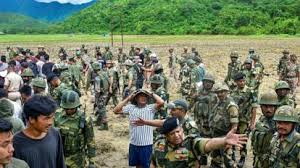Govt-Kuki talks heading towards free movement deal in Manipur

Manipur remains caught in a tense standoff between the Indian government and Kuki tribal leaders. While the Centre pushes for normalcy through free movement across blocked roads, the Kuki leadership demands deeper solutions. Justice, political recognition, and autonomy are at the core of their stance. Talks continue, but progress remains elusive.
Free Movement Directive Sparks Protest
In March 2025, Union Home Minister Amit Shah ordered the restoration of free movement across Manipur’s roads. He asked security forces and local authorities to ensure compliance by March 8. According to the government, opening blocked roads was key to restoring order. It also carried symbolic value, reinforcing territorial unity.
However, Kuki tribal leaders viewed the directive with deep concern. They feared it ignored real risks. Unchecked movement, they warned, could lead to renewed ethnic clashes. Past incidents had shown that such access often resulted in ambushes and violence.
Shutdown and Local Resistance
On March 9, the Kuki-Zo Council (KZC) launched a total shutdown in protest. Schools, shops, and transport services came to a halt in many Kuki-majority areas. Their message was clear: safety and justice must come before road access.
The shutdown followed violent protests in Kangpokpi. Clashes with security forces left many injured. Kuki groups said the violence confirmed their fears. Without guarantees, free movement was dangerous, not helpful.
Civil society groups, student bodies, and tribal elders supported the protest. They argued that restoring peace required more than open roads. It needed dialogue and trust — both of which were missing.
The Core Issues: Justice and Autonomy
Kuki demands go beyond transport concerns. At the heart of the standoff lies a long-standing call for separate administration in the hill districts. Tribal leaders believe the current system centers power in Imphal and sidelines their communities.
Their key demands include:
- A six-month ceasefire and withdrawal of certain security deployments.
- A formal political dialogue with tribal representatives.
- Limits on Meitei access to Kuki-majority areas.
- Administrative autonomy for hill districts.
These are not new concerns. But after the ethnic violence of 2023, they gained urgency and wider support among tribal communities.
Talks Fail to Make Headway
So far, multiple rounds of discussion have failed to produce an agreement. Officials met with Kuki leaders in Delhi and Imphal. But the absence of concrete proposals on autonomy led tribal groups to pull out.
Government negotiators maintain that road access is vital. They argue that peace and daily life cannot wait for a political breakthrough. The Kuki side disagrees. Without safety and justice, they say, movement will only bring new conflict.
Central leaders have also rejected calls for separate administration. They believe such a step could divide the state and embolden secessionist demands.
A Tactical Pause, Not a Truce
By mid-March, the KZC ended the shutdown. Shops and schools reopened. But tribal leaders said their position had not changed. They opposed free movement until core demands received attention.
The decision to pause the protest aimed to reduce hardship for local people. It was not, they clarified, a sign of surrender. “Our silence is not peace,” one tribal elder said during a local gathering.
The government welcomed the pause but continued to urge cooperation. However, tensions remain high, and trust is still lacking.
Standoff With No Easy Exit
Kuki leaders, including elected MLAs and armed groups under the Suspension of Operations agreement, have frozen talks. They want a roadmap for justice and autonomy before they return to the table.
Meanwhile, Meitei groups continue to push for unified governance. Civil society organizations from the valley demand road access and oppose any split in Manipur’s territory.
Attempts to introduce bus services across regions have failed. Each such move sparks fear or anger, showing just how deep the divide runs.
What’s Next?
The path ahead remains uncertain. Will the Centre offer a compromise on autonomy? Can tribal leaders trust a peace process that begins with road orders but skips justice?
Without political will on both sides, healing remains far off. Free movement may restore traffic, but it won’t restore trust. Roads alone cannot carry the burden of reconciliation.
In Manipur, every road passes through memories of conflict. Until both communities feel heard and respected, true peace will remain out of reach.






